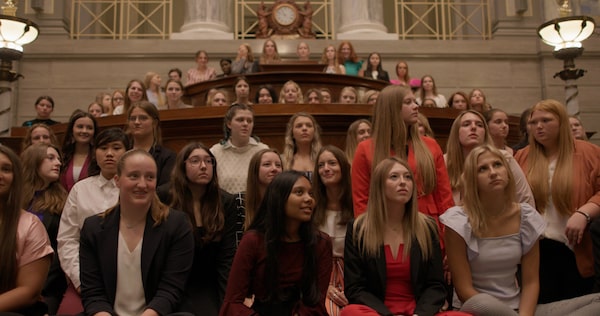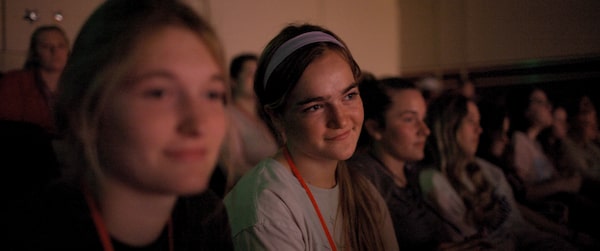- Girls State
- Directed by Amanda McBaine and Jesse Moss
- Starring Emily Worthmore, Maddie Rowan, Nisha Murali, Tochi Ihekona
- Classification G; 98 mins
- Streams on Apple TV+ on April 5
Who run the world? As far as the United States is concerned, it’s not really girls. But that doesn’t mean they aren’t trying. Girls State is a powerful documentary that showcases just how invested and determined young women are in their desire to run for the highest office – despite the challenges they face.
The film is a corollary to the critically acclaimed documentary Boys State, in which filmmakers Amanda McBaine and Jesse Moss trained their cameras on 1,000 teenage boys in Texas who came together for a weeklong endeavour known as Boys State to create a mock government. That film highlights the follies of youth more than its optimism, a Lord of the Flies-like cautionary tale about what the future may hold at the hands of young men.
Turns out McBaine and Moss were similarly interested in finding out what happens at the girls’ version of that event. Also run by the American Legion, Girls State began in 1938, three years after the first Boys State session. By 1984 it was operating in every state except Hawaii, we learn. “We’ve all grown up in a world that has not seen a female president,” an organizer tells the assembly of young women at the beginning of Girls State. “How do we change that?”
The documentary follows girls attending the annual event in Missouri, once a swing state and now considered more red than blue. The 2022 program the documentary crew captures is unique in that both the Girls State and Boys State events take place side-by-side, offering up immediate comparisons – right from the bus ride to the venue.
Too many movies on your to-watch list? Here are the best films of 2023

Participants in Girls State, premiering on Apple TV+.Apple TV+
“Are they seriously singing Ice Ice Baby,” Tochi Ihekona says, flabbergasted by a bunch of boys at the back of the bus belting out the tune. The daughter of Nigerian immigrants, Ihekona is well aware that she’s going to be in the minority among a largely white gathering and finds herself navigating the ignorance and interest of her peers with equanimity.
Meanwhile, policy wonk Nisha Murali, who arrives at the Lindenwood University campus with a copy of the leaked draft opinion of Dobbs v. Jackson Women’s Health Organization, is dealing with societal pressure to be more approachable and not so serious all the time. Ihekona and Murali choose to run for the positions of attorney-general and Supreme Court justice, respectively, instead of governor. They are most interested in debating and changing laws, especially with the question of abortion rights hanging heavy in the air.
The young women running for governor are equally passionate. One of the front-runners is Emily Worthmore, a self-described conservative who is interested in talking to and learning from her peers about their differing viewpoints and believes in grassroots canvassing. Her competition includes Cecilia Bartin, a firecracker feminist who can command a noisy cafeteria crowd, and Faith Glasgow, a passionate and plain-speaking orator who is admittedly “judgmental.”

Emily Worthmore and Maddie Rowan in Girls State.Apple TV+
It’s fascinating watching the young women evolve in their friendships and thought processes, especially as it dawns on them just how different Girls State is run than the boys’ version. The young women are frustrated by the dress code they need to follow and the warning to not wander alone because the boys are around; the boys don’t have to worry about such diktats. You don’t really see the girls rolling their eyes, but it’s there – especially when some of the meetings start with a “Hey, girl, hey” or with a group song that sounds more like a pep rally.
The girls eventually do get down to business. They argue a Supreme Court case on abortion rights. Eloquent presentations are made in the race for the top job. And, in a bit of a meta moment, there’s even a journalistic investigation of how Girls State is funded and run compared with Boys State. A scholarship is handed out.
The result is a thought-provoking film, especially as you realize that the young women are learning some hard life lessons that will serve them well in the future. Sometimes the fight may seem futile. But you have to keep trying.
In the interest of consistency across all critics’ reviews, The Globe has eliminated its star-rating system in film and theatre to align with coverage of music, books, visual arts and dance. Instead, works of excellence will be noted with a critic’s pick designation across all coverage. (Television reviews, typically based on an incomplete season, are exempt.)